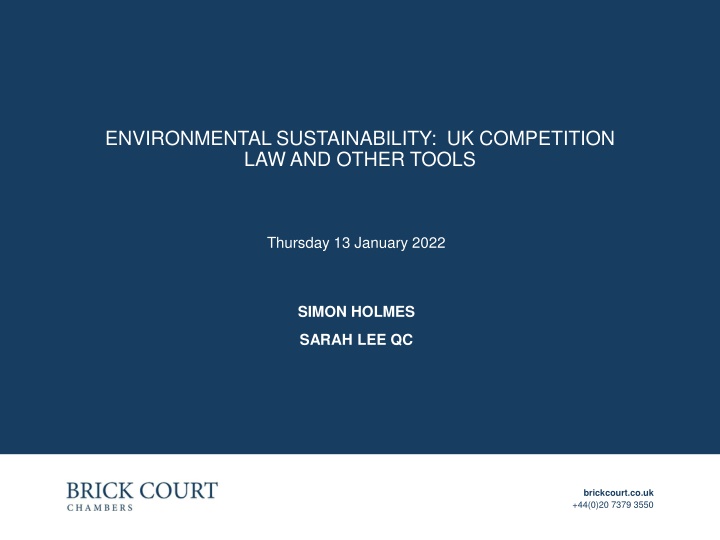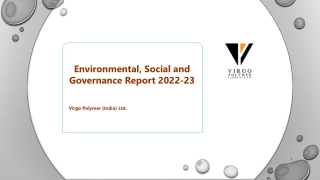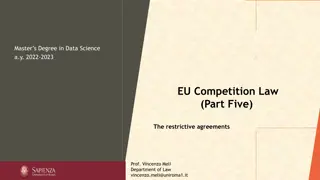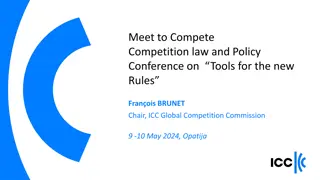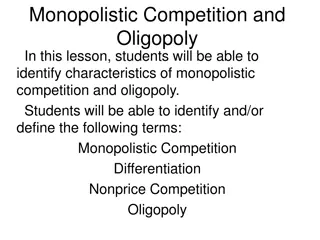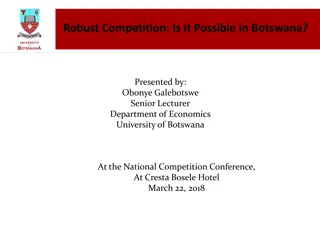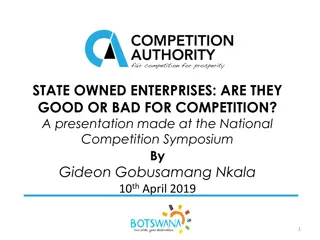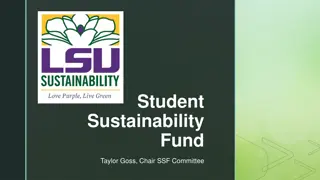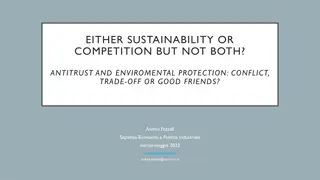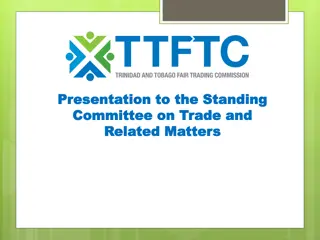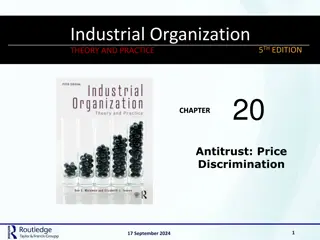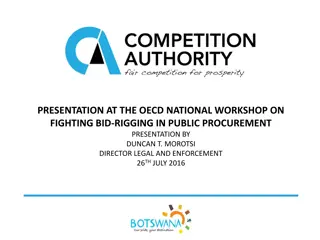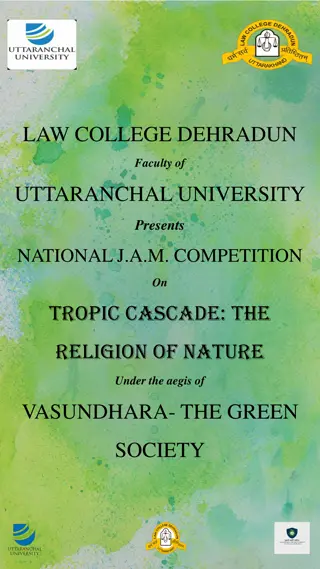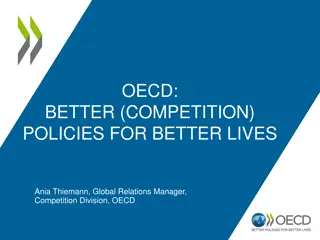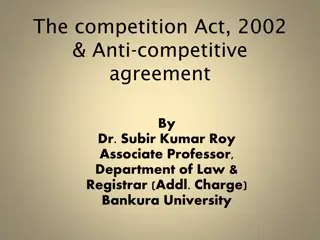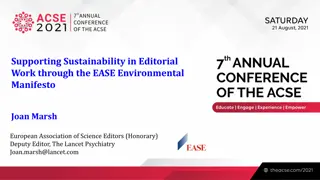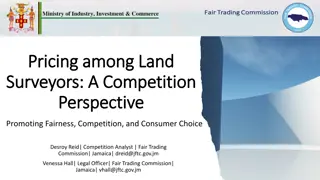Environmental Sustainability and UK Competition Law
Explore the intersection of environmental sustainability and UK competition law in a presentation by Simon Holmes and Sarah Lee, covering climate change, sustainability, and competition laws. The discussion includes the moral imperative of addressing climate change, tools available for regulation, and the importance of cooperation among businesses to combat environmental challenges.
Download Presentation

Please find below an Image/Link to download the presentation.
The content on the website is provided AS IS for your information and personal use only. It may not be sold, licensed, or shared on other websites without obtaining consent from the author.If you encounter any issues during the download, it is possible that the publisher has removed the file from their server.
You are allowed to download the files provided on this website for personal or commercial use, subject to the condition that they are used lawfully. All files are the property of their respective owners.
The content on the website is provided AS IS for your information and personal use only. It may not be sold, licensed, or shared on other websites without obtaining consent from the author.
E N D
Presentation Transcript
ENVIRONMENTAL SUSTAINABILITY: UK COMPETITION LAW AND OTHER TOOLS Thursday 13 January 2022 SIMON HOLMES SARAH LEE QC brickcourt.co.uk +44(0)20 7379 3550
CLIMATE CHANGE, SUSTAINABILITY & COMPETITION LAW SIMON HOLMES* VISITING PROFESSOR, OXFORD UNIVERSITY; MEMBER UK COMPETITION VISITING PROFESSOR, OXFORD UNIVERSITY; MEMBER UK COMPETITION APPEAL TRIBUNAL; LEGAL ADVISOR TO APPEAL TRIBUNAL; LEGAL ADVISOR TO CLIENTEARTH THE UCL CENTRE FOR LAW, ECONOMICS AND SOCIETY; FOUNDING MEMBER O THE UCL CENTRE FOR LAW, ECONOMICS AND SOCIETY; FOUNDING MEMBER OF F THE FORUM FOR INCLUSIVE COMPETITION; MEMBER OF THE COMPETITION THE FORUM FOR INCLUSIVE COMPETITION; MEMBER OF THE COMPETITION COMMISSION OF THE INTERNATIONAL CHAMBER OF COMMERCE (ICC); AND A COMMISSION OF THE INTERNATIONAL CHAMBER OF COMMERCE (ICC); AND A MEMBER OF THE INTERNATIONAL ADVISORY BOARD OF THE MEMBER OF THE INTERNATIONAL ADVISORY BOARD OF THE LDC DE LA DE LA DERECHO DERECHO DE LA DE LA COMPETENCIA CLIENTEARTH, ASSOCIATE MEMBER OF , ASSOCIATE MEMBER OF LDC ( (INSTITUTO INSTITUTO COMPETENCIA). ). * The views expressed here are personal and cannot be attributed to any institution with which Simon is connected
1(1). INTRODUCTION A. The issue B. In the beginning .. C. Where have we got to? --- national authorities - Dutch - others --- industry --- international bodies --- EU Commission - Commission Policy Brief --- opposition 3
1(2) INTRODUCTION D. Areas of Competition Law i) Co-operation ii) Abuse of Dominance-sword? -shield? iii) Mergers iv) State Aid v) Public procurement. vi) Market Investigations? E. My approach today 4
2(1). CLIMATE CHANGE: The Moral Imperative * Existential crisis all hands to the pump! * Regulation but not always enough * Unilateral action by business *The need to co-operate- first mover disadvantage - scale - egs *Fear of Competition Law * No Green Washing! -- car emissions (AdBlue) -- spill over -- consumer law 5
2(2). CLIMATE CHANGE: we have the tools *We have the legal tools --- EU constitutional provisions --- National legislation and climate change plans --- competition provisions 6
3(1). GOALS OF COMPETITION The Constitutional Provisions of the Treaties: Treaty on European Union Article 3 Article 3(3)of the Treaty on European Union sets out the EU s objectives: The Union shall work for the sustainable development of Europe and a high level of protection and improvement of the quality of the environment Article 3(5) says: it shall contribute to the sustainable development of the earth and to free and fair trade (emphasis added) 7
3(2). GOALS OF COMPETITION The Treaty on the Functioning of the European Union ( TFEU ) Articles 7, 9 and 11 Article 7 says: The Union shall ensure consistency between its policies and activities taking ALL of its objectives into account Article 11 says: Environmental protection requirements MUST be integrated into the definition and interpretation of the Union policies and activities, in particular with a view to promoting sustainable development (emphasis added) 8
3(3). GOALS OF COMPETITION *Focus on the law, not abstract imported concepts --- consumer welfare --- public interest --- non-economic factors --- non-competition factors Consumer Welfare : *not in the treaty or endorsed by the CJEU *but could be ok---health, happiness, the future of a person or group ---well-being and good health 9
3(4). GOALS OF COMPETITION No Image 10
4(1). HOW TO ESCAPE ARTICLE 101.(and Chapter1). 3. Ancillary restraints/Objective necessity doctrine 4. Exemption Route 101(3) 2. the Albany route 4 conditions: i) contribute to improving the production OR distribution of goods OR to promoting technical OR economic progress ; ii) Fair Share for Consumers; iii) No more restrictive than necessary; iv) No elimination of competition. 1. No restriction of competition 5. Standardisation Route 11
4(2). ARTICLE 101. Agreements that do not Restrict Competition * Horizontal Guidelines-2001, 2010 and next * Examples: JAMA KAMA 1000s of others! (see submissions re HLGs eg Unilever Submission). * Block exemptions-EU/UK 12
4(3). ARTICLE 101. The Albany Route *Reliance on constitutional provisions *Policy decision *Why not climate change? 13
4(4). ARTICLE 101. Ancillary Restraints / Objective Necessity *Albany *Wouters *Sustainability Agreements: proportionate restrictions without which agreement would not to be concluded Necessary to carry out environmental regulatory task *Not tested opportunity? *Policy again climate emergency 14
4(5). ARTICLE 101(3). Condition 1: Improvements and Progress Agreements must: contribute to improving the production or distribution of goods or to promoting technical or economic progress (emphasis added) *two mistakes --- economic element --- pro-competitive effects 15
4(6) EU POLICY BRIEF-Sustainability Benefits Commission recognise as sustainability benefits: *Qualitative efficiencies * Cost efficiencies; and * Consumers appreciate more sustainable products 16
4(7). ARTICLE 101(3) Condition 2: Fair Share for Consumers Which consumers ? Fair share of the resulting benefit . Proper weight to what really matters Constructive dialogue 17
4(8) POLICY BRIEF - FAIR SHARE ISSUE * benefits achieved on separate markets can be taken into account ; but *Consumers affected must be substantially the same -not the law -not fit CECED -not fit the Green deal or climate crisis. *Application-large no of customers -few customers. *Makes no sense! 18
4(9). ARTICLE 101(3) Condition 3: No More Restrictive Than Necessary The agreement must not: impose on the undertakings concerned the restrictions which are not indispensable to the attainment of those objectives (i.e. the improvements and progress in Condition 1) 19
4(10). ARTICLE 101(3) Condition 4: No Elimination of Competition The agreement must not: afford such undertakings the possibility of eliminating competition in respect of a substantial part of the products in question 20
4(11). ARTICLE 101(3). The Standardisation Approach *Suit sustainability agreements? *Commission guidance *More lenient? 21
5. Article 102-Abuse of Dominance A. Article 102 as a Sword * meaning of abuse? *exploitative abuses? *Unfair purchase prices? B. Sustainability as a Shield * eg - where not discriminatory pricing or refusal to supply * don t discourage doing the right thing 22
7(1).Yes we can or ITS ALL TOO DIFFICULT? Must apply the law What is important? Risk irrelevance Narrow approach is difficult Balancing is what we do NCAs are very well equipped 23
7(2). YES WE CAN or ITS ALL TOO DIFFICULT? * This is an economic approach externalities/ true Price --- quantitative techniques --- value judgements *Political? *Fairness *Slippery Slope *Democratic Legitimacy NB ---Still need regulation YES WE CAN !!!!! 24
8. PROPOSALS FOR ACTION 1. Positive Statements 2. Test cases 3. Publishing legal opinions 4. Updating Guidelines and Notices 5. Guidance on authorities priorities ( supporting the transition to a low carbon economy ) 6. Block Exemptions? 7. Changes to the law? 25
8. PROPOSALS FOR ACTION contd 8. Lessons from Covid 19: * CMA s approach; * Exclusions; 9. More radical ideas: * State compulsion defence? * UK Future Generation Act? * Embed climate change and sustainability in all public acts? Competition Law can cease to be part of the problem and become part of the solution YES WE CAN ! 26
9 (1). CONCLUSION *Can do much without changing the law revisit the law and economics Are you happy with what competition law is doing? More robust advice (eg Fair Wear Foundation- living wage ). *May still need changes *Genuine difficulties technical issues ---conservative competition establishment *Things moving in our direction. *Vital role for us all 27
ANNEX A (1). PUBLICATIONS ON SUSTAINABILITY AND COMPETITION (Simon Holmes) 1. JAE Paper Climate Change, Sustainability and Competition Law : https://academic.oup.com/antitrust/article/8/2/354/5819564?login=true 2. Climate Change, Sustainability and Competition Law in the UK (published in the ECLR, July, 2020); https://www.law.ox.ac.uk/sites/files/oxlaw/cclp_working_paper_cclpl51.pdf 3. Climate Change and Competition Law Simon Holmes note for OECD Roundtable on sustainability and competition law: https://one.oecd.org/document/DAF/COMP/WD(2020)94/en/pdf 4. Horizontal agreements between companies-revision of EU competition rules. ClientEarth and Simon Holmes contribution to the Commission s consultation. https://www.clientearth.org/media/3c4lsaex/clientearth-and-s-holmes-contribution-horizontal-agreements-04-10-2021.pdf 5. "Competition Policy supporting the Green Deal". [Concurrences No 1-2021]. https://www.concurrences.com/en/review/issues/no-1-2021/conferences/sustainable-development-what-role-for-competition- policy-new-frontiers-of 28
ANNEX A (2). PUBLICATIONS ON SUSTAINABILITY AND COMPETITION (Simon Holmes). 6. Climate Change is an existential Threat: competition law must be part of the solution and not part of the problem [CPI Antitrust Chronical, July 2020]. https://www.competitionpolicyinternational.com/climate-change-is-an-existential-threat- competition-law-must-be-part-of-the-solution-and-not-part-of-the-problem/ 7. Consumer welfare, sustainability and competition law goals [Concurrence No 2-2020]. https://www.concurrences.com/en/review/issues/no-2-2020/foreword/consumer-welfare-sustainability-and-competition-law- goals-93496-en 8. Covid 19 Lessons for climate change blog: http://competitionlawblog.kluwercompetitionlaw.com/2020/04/23/climate- change-sustainability-and-competition-law-lessons-from-covid-19/ See also Competition Law, Climate Change & Environmental Sustainability , edited by Simon Holmes, Dirk Middelschulte and Martijn Snoep-a collection of some 40 essays. [Concurrence]. https://www.concurrences.com/en/all-books/competition-law- climate-change-environmental-sustainability 29
ANNEX B (1). EXAMPLES OF WHERE FEAR OF COMPETITION LAW HAS INHIBITED VITAL ACTION TO FIGHT CLIMATE CHANGE AND PROMOTE OTHER SUSTAINABILITY GOALS 1. In the supermarket sector, in order to bring about a meaningful reduction of single use plastic and increase rates of recycling, big names need to work together. If a single supplier works with each of its supermarket customers the systems they agree may not work for other suppliers: this is inefficient and sub optimal from a sustainability perspective. Similarly, if a supermarket works with each of its suppliers the systems they agree may not work for other supermarkets: again, this is inefficient and sub optimal from a sustainability perspective. If suppliers and retailers work together (with appropriate safeguards) whole systems can be made more sustainable and at a faster pace. 2. Deforestation is the 2nd largest source of GHGs and a major driver of biodiversity loss with most of this being driven by activity in the Amazon and Cerrado regions in the Mercosur. Leading soft commodity traders have expressed a willingness to work together to tackle this issue but often cite competition law concerns as a limiting factor. While there need to be limits to the information exchanged and what is agreed, the competition rules need to facilitate, rather than impede, vital joint work to tackle this. 3 .A major and growing concern is the link between crops like soya and tropical deforestation and conversion of native vegetation with consequent impacts on bio- diversity, carbon emissions, water systems and local communities. Initiatives like the UK RoundTable on sustainable Soya bring together key players in the market to work together to achieve a secure, resilient sustainable supply of soya: ie soya that is legal and cultivated in a way that protects against conversion of forests and valuable native vegetation. What is sustainable soya, and what is not, is a complex question which industry players (with expert advice) are well placed to analyse and to develop appropriate criteria- while leaving industry players free to make their own unilateral purchasing decisions. Again, this can be done without infringing competition rules but legal uncertainty has meant that many players, while in principle ready to play their part, are nervous of doing so. 30
ANNEX B(2). EXAMPLES OF WHERE FEAR OF COMPETITION LAW HAS INHIBITED VITAL ACTION TO FIGHT CLIMATE CHANGE AND SUPORT OTHER SUSTAINABILITY GOALS. 4. The fashion industry has a huge environmentally harmful impact, particularly in terms of the raw materials going into garments which are often only worn for a few months, but also in terms of the impact in producer countries (land clearance, water usage etc). It also has a significant role to play in terms of social sustainability (eg avoidance of child labour and other forms of exploitation of workers in some of the poorest countries in the world). Many in the industry acknowledge this and the Fashion Pact was established to change things recognising that no single company or executive can enact change at the scale or speed needed to protect our planet . While respecting the boundaries, it is important that competition rules do not impede such valuable work. 5. Fishing quotas are agreed by governments but the industry and consumers have an interest in avoiding overfishing and depletion of stocks and are often willing to go further and/ or faster than governments. An example of this is an agreement among suppliers and UK retailers to ensure that mackerel is fished on a sustainable basis as stocks are depleted in the North Atlantic. The system is carefully designed to comply with competition rules but at one point one firm took the view that a boycott of unsustainably caught fish would transgress competition law as an anti-competitive boycott. Others appreciated that the system was competition compliant. We need to work hard to ensure that all businesses understand that such vital collaborative efforts can work within the existing competition rules and that such initiatives are not held up, or unnecessarily limited in scope, as a result of unfounded fear of competition enforcement. Simon Holmes. Visiting Professor of Law Oxford University. Judge, UK Competition Appeal Tribunal. 31
ENVIRONMENTAL SUSTAINABILITY: UK COMPETITION LAW AND OTHER TOOLS Thursday 13 January 2022 SARAH LEE QC brickcourt.co.uk +44(0)20 7379 3550
THE CHAPTER I AND II PROVISIONS AND THE CMA Chapters I and II of the Competition Act 1998 mirror Arts. 101 and 102 respectively. The potential for finding that sustainability agreements escape prohibition, or else benefit from an exemption under section 9(1), is the same as under EU competition law. Section 18 likewise has the same potential as EU law for use as a sword or a shield in relation to conduct of dominant undertakings. CMA information sheet 27.1.21 on Environmental sustainability agreements and competition law. Supporting transition to a low carbon economy a strategic objective for the CMA. brickcourt.co.uk +44(0)20 7379 3550
S. 60A OF THE COMPETITION ACT 1998 Under s. 60A, courts, the CAT and the CMA must: - Generally (and subject only to a few exceptions) act with a view to ensuring that there is no inconsistency in the application of principles of competition law laid down in EU law provisions and decisions of the EU Court before the end of 2020. Have regard to have regard to relevant decisions or statements of the European Commission before the end of 2020, unless withdrawn. brickcourt.co.uk +44(0)20 7379 3550
OTHER NCAS Dutch Authority for Consumers & Markets (ACM) : - Draft Guidelines on Sustainability Agreements 9.7.20. New Draft - 26.1.21. Guidelines on Sustainability Agreements Opportunities within competition law Approach to identify situations where the benefits for society as a whole outweigh the disadvantages of any restriction of competition. brickcourt.co.uk +44(0)20 7379 3550
ACM DRAFT GUIDELINES ACM Draft Guidelines For EU-wide discussion. Will not impose fines for collective agreements where the draft Guidelines have been followed in good faith. Technical report (Jan 2021) commissioned by ACM and Greek competition authority (HCC) on how to show and gauge sustainability benefits. brickcourt.co.uk +44(0)20 7379 3550
SCOPE FOR CHANGE? Will we see a change of approach in the UK in the future? CMA s Call for Inputs (deadline was in November 2021). UK s international obligations, including the Trade and Cooperation Agreement signed with the EU. Principles and objectives in Title XI, including ambitions on climate neutrality by 2050 in line with the European Green Deal. Article 7.4 in Title XI. Parties adopt the principle that environmental protection should be integrated into the making of policies . brickcourt.co.uk +44(0)20 7379 3550
ABUSE OF DOMINANCE A mechanism for outlawing environmentally unsustainable business practices by dominant companies, which make it impossible for others to compete unless they too adopt such practices methods other than normal competition. Commission s PPC investigation March 2021 includes looking at whether whether largest supplier of wholesale and retail electricity in Greece has slowed down investment into greener energy. Further tools - looking further at supply chain imbalances, even absent dominance? brickcourt.co.uk +44(0)20 7379 3550
OTHER AREAS AND MECHANISMS TRADE, PROCUREMENT ETC. Trade remedies and sustainability: - Subsidies where environmental standards not complied with? Public interest test for remedies UK; Union interest test EU. EU Green Public Procurement and environmental goals future compulsory environmental protection objectives in laws and policies? In general, perhaps move towards new balances and clearer obligations on environmental issues. brickcourt.co.uk +44(0)20 7379 3550
ENVIRONMENTAL SUSTAINABILITY: UK COMPETITION LAW AND OTHER TOOLS Thursday 13 January 2022 SIMON HOLMES SARAH LEE QC brickcourt.co.uk +44(0)20 7379 3550
